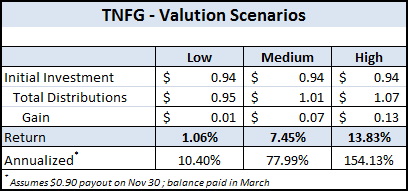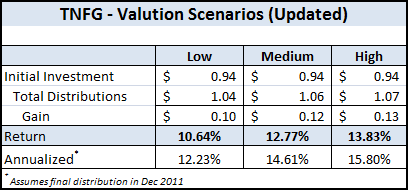Tikcro Technologies LTD (TIKRF.PK) is an Israeli company involved in a lengthy battle with one of its primary investors.
At current prices, the stock sells at a discount to net cash, in addition to holding a profitable stake in another bio-tech stock traded on the Israeli exchange.
The stock offers an interesting risk/reward play, but uncertainty remain with the company’s long-entrenched management team.
Background
In April 2003, TIKRF sold off its legacy business to STMicroelectronics and turned into a blank check company. According to the SEC, a blank check company
“is a development stage company that has no specific business plan or purpose or has indicated its business plan is to engage in a merger or acquisition with an unidentified company or companies, other entity, or person.”
The PinkSheets are littered with many such entities. The company describes its goals in a recent SEC filing:
“Our business plan is to enter into one or more transactions with a wide variety of businesses without limitation as to their industry or revenues.”
After several years of searching, the company announced an investment in BioCancell Therapeautics, Inc, an Israel-based clinical-stage biopharmaceutical company, in June 2008.
BioCancell Investment
BioCancell (TASE: BICL) is focused on developing a drug, BC-819, to treat a specific gene that causes tumors in many types of cancer, especially the bladder, pancreatic, and ovarian varieties.
To date, the company has generated no revenues and is on the long (and expensive) path of proving out the drug through multiple clinical trials in an attempt to pass the governmental approval process.
Tikcro invested $2.5m in BioCancell and received 837,521 shares of common stock and a four-year convertible note (convertible for up to 3,464,385 additional shares), as well as a 4-year warrant to purchase an additional 4.3m shares for $3m.
With this investment, Tikcro holds approximately 25% of Biocancell, including the convertible note and warrants (or approx. 12.5% based on its current investment without putting in additional capital to exercise the warrants).
BICL’s stock is up 35% since Tikcro’s initial investment. However, it is still unclear whether the company will create value for shareholders or turn out to be worthless, as success in bio-pharm companies is notoriously fickle.
Current Financials
As of June 30, 2010, TIKRF had $7.36m in cash and short-term marketable securities, offset by only 274k in current liabilities, for a net cash position of $7.09m. Dividing this cash balance by the number of shares outstanding (8.491m) equals net cash per share of $0.835.
However, the stock trades at a price of only $0.655, a discount of almost 22%, without taking into account the investment in BioCancell.
According to the TASE website, BICL closed with a market cap of 78,500 NIS thousands. Converted to dollars, this equals a total market cap of $21.64m.
With its 12.5% stake, the investment is worth an additional $2.71m or $0.32 per share for TIKRF.
Including this investment, investors are receiving $1.155 in value for only $0.655, a discount of 43%.
Interesting right? But its only the beginning…
Enter Mr. Steven N. Bronson
Steven N. Bronson is the founder and CEO of Catalyst Financial, a full-service investment banking firm. According to the official bio, he has over 27 years of Wall Street experience (in addition to describing himself as a “successful value investor.”)
Bronson has held a large position in TIKRF for years, announcing a 13-D position back in 2004. Based on the company’s most recent filing, Bronson holds 13.9% of shares outstanding.
Bronson has been involved in a prolonged activist fight against the entrenched management team of TIKRF. Through a series of letters, both personally and through a lawyer, Bronson has pushed to return TIKRF’s excess cash to shareholders and remove the current management team.
It is fascinating to watch how the fight has unfolded.
On August 14, 2007, Bronson writes:
“I am writing this letter to express my sincere concerns regarding the recent decision by management of Tikcro Technologies, Ltd. (Tikcro) to reject the business opportunity I introduced to Tikcro which involved both a significant capital infusion into Tikcro, as well as the leadership of a well respected and successful entrepreneur (the Transaction).
I also ask that the Board adopt a stock repurchase program, whereby Tikcro uses up to 20% of its assets to repurchase its shares in open market transactions whenever Tikcro’s shares are trading at prices below net tangible book value… any such repurchases by Tikcro will be accretive to shareholder value.”
In a letter dated October, 16, 2007, Bronson complains that TIKRF’s management team tried to grant itself stock options for 8.8% of the company at below its cash per share price:
“It is rather surprising that Messrs. Tamir and Paneth’s existing 26.6% ownership interest in Tikcro is not a sufficient incentive for Messrs. Tamir and Paneth to generate value for Tikcro’s shareholders.”
A year later, Bronson tries a different tact, applying for a liquidation of the company via a letter from his lawyer:
“Please be advised that it is our client’s view, in light for the current circumstances of the Company, including the current stock price and the conduct of the Board, that there are substantial causes to apply for the liquidation of the company.”
A month later, Bronson submits a new business plan, calling for an immediate distribution of $7.7m in company cash and a pro-rata portion of the company’s investment in BioCancell to common shareholders.
Despite several subsequent letters, it appears that the proposal was dismissed by TIKRF’s management team, as they moved forward with the annual shareholder meeting without considering the proposal.
Finally, on June 10, 2009, Bronson filed a lawsuit in the Tel Aviv District Court pushing for the company to consider the proposed business plan and return cash to shareholders, as well as complaints surrounding legality of group voting and compensation practices of the management team.
After the company called another shareholder meeting scheduled for September 2009 (once again, without the proposal), Bronson responded with another scathing letter:
“One needs to ask a very simple question, WHY is the Board delaying or should I say more accurately blocking, the submission of the Bronson Proposal to a vote of Tikcro’s shareholders. The simple answer is to protect the entrenchment of Messrs. Tamir and Paneth control over Tikcro.”
Once again, his requests were ignored. So Bronson tried a new tact in February 2010 – calling out that management failed to follow lawful procedures when electing the latest set of directors. According to Bronson’s lawyer:
“Tikcro was also advised that any decisions by Tikcro’s board taken without amending this fundamental fault are also not valid and cannot bind Tikcro.”
Since the February letter, there hasn’t been any communication (at least publicly), between the management team and Bronson.
Meanwhile, TIKRF continues on, filing its public reports and continued updates on progress at BioCancell.
Conclusion
The long fight by Steven Bronson sums up the challenges of investing in many of these micro-cap stocks.
It only reinforces the importance of finding capable management teams that truly care about creating value for common shareholders.
Even powerful activists like Bronson, with significantly more resources and legal help than the average investor, can sometimes be thwarted by entrenched management. In this case, the situation is only compounded by investing in foreign stocks governed by their own set of laws and procedures.
If Bronson prevails, TIKRF could instantly become an attractive value investment – picking up the excess cash for a discount while receiving the BioCancell business for free.
If not, it could be the classic case of a value trap, with a management team that is controlling shareholder’s destiny. A bad decision or investment by the management team could wipe out the cash balance and any margin of safety in an instant.
For now, I’ll continue watching from the sidelines.
Disclosure
No positions.


